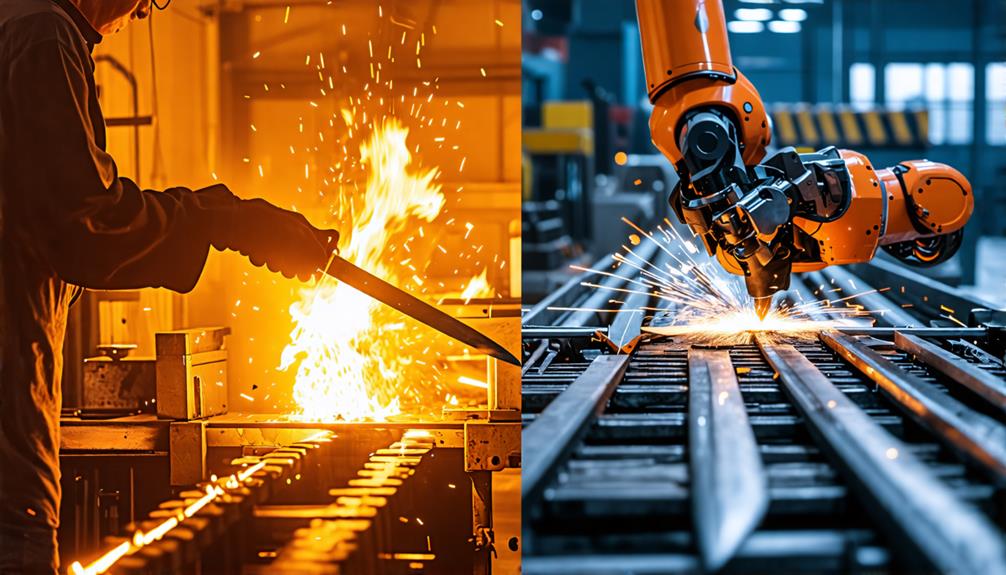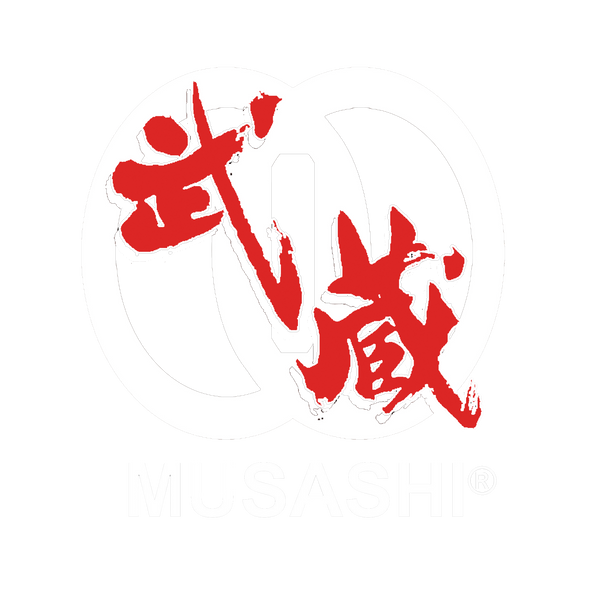
Sword-making is an old craft that shows big differences between hand-made and machine-made swords. Skilled workers make hand-made swords with great care. They use special high-carbon steel and put a lot of effort into forging, tempering, and polishing each sword. This makes each hand-made sword unique and high-quality.
Machine-made swords, on the other hand, focus on being the same every time and making many swords quickly. They use regular materials and new technology. While machine-made swords are precise, they don't have the personal touch or history that hand-made swords do.
Still, as technology gets better, machine-made swords are becoming stronger and working better. Looking closely at both ways of making swords teaches us about how good the materials are, how long the swords last, and how much they're worth.
Key Takeaways
- Japanese swords come in different types like katana, tanto, and tachi. Each has its own special use and history.
- When buying swords, it's important to check if they're real and in good shape. Look at things like the blade condition and how well it's made.
- To start a collection, learn about sword history and famous makers. This helps you enjoy your swords more and spot the good ones.
- Set a budget for buying swords and focus on getting high-quality ones that might be worth more later.
- Take good care of your swords by cleaning them carefully and keeping them away from damp places. This will help them last longer and look better.
Historical Background
Sword-making has a long and exciting history that spans thousands of years and many cultures. From ancient times to the Middle Ages, skilled craftsmen created swords using special techniques passed down through families. Each culture added its own unique touches to sword design.
As time went on, new materials changed how swords were made. First, people used bronze, then iron, and finally steel. These changes made swords stronger and better in battle. Clever blacksmiths even found ways to mix different types of steel to make swords both strong and flexible.
Swords weren't just weapons; they meant a lot to the people who owned them. In Japan, samurai warriors saw their katana swords as part of their spirit. In Europe, knights carried longswords as symbols of their honor. During times of war, more swords were made, while peacetime allowed for fancier designs.
The way swords were made depended on what people wanted and needed. This history helps us understand the differences between swords made by hand and those made by machines today.
Craftsmanship Techniques
Hand-made and machine-made swords use different crafting methods, which affect their quality and style. Old-school sword makers use skills passed down for centuries. They carefully forge, temper, and polish each sword by hand. These experts shape the blade with a hammer and anvil, making sure it's strong and flexible. This careful work creates unique swords that show off the maker's special touch.

Modern sword-making uses new technology. Machines and computers now do a lot of the work. They can make swords quickly and the same every time. Computer programs help design the swords, and special machines cut the metal precisely. This way is faster and cheaper, but the swords often lack the personal feel of hand-made ones.
Both ways of making swords have good points. Today's sword makers often mix old and new methods. This blend of tradition and technology shapes how swords are made now. Each method has its own strengths, giving swords different looks and uses.
Material Quality
The quality of materials makes a big difference in how well swords work, whether they're made by hand or machine. Good steel is key for making strong, sharp blades that last. Hand-made swords often use high-carbon steel, which is very strong and stays sharp. Skilled craftspeople carefully pick and treat the steel, allowing them to create detailed designs and beautiful finishes.
Machine-made swords usually use standard materials. Modern machines can make swords with consistent quality, but they don't have the personal touch of hand-made swords. This can lead to differences in how well the swords perform.
The weight and balance of a sword also depend on the materials used:
- High-carbon steel keeps its edge well and bends without breaking, which helps balance the sword.
- Different metal mixes can make the sword stronger in some ways but might affect its balance.
- Heating and cooling the steel the right way makes it stronger and helps with balance and durability.
Durability and Longevity
Swords that last a long time and don't break easily are important. Skilled craftsmen who make swords by hand often create tougher blades. They carefully heat and fold the metal, making it strong but flexible. Each sword is made with care, looking great and lasting for years.
On the other hand, machines make swords quickly and cheaply. These swords might not be as tough and could chip or break more easily. But new technology is making machine-made swords better than before.
How long a sword lasts also depends on how you take care of it. Hand-made swords need more attention. You should oil them, keep them sharp, and store them properly to prevent rust. Machine-made swords might need less care, but you should still look after them.
In the end, how long a sword lasts depends on how it's made, what it's made from, and how well you take care of it.
Performance and Functionality
When looking at how well swords work, we need to think about how well they're made, how balanced the blade is, and what the sword is for. There are some big differences between swords made by hand and those made by machines.
- Precise Making: Machines can make swords that are all the same and cut well. They use fancy tech to make sure each sword is just right, so they can make lots of them quickly without messing up the sharpness or balance.
- Cool Designs: Hand-made swords often look better because the maker pays close attention to every little detail. Each sword is special and shows off the maker's skills. These swords often have fancy designs that make them work well and look great.
- Easy to Use: A sword needs to be balanced to work well. Hand-made swords are often made to feel just right for the person using them. Machine-made swords are all the same, so they might not feel as good to use for everyone.
Cost and Value
Hand-made and machine-made swords differ in cost and value. To understand why, we need to look at how they're made.
Hand-made swords cost more because skilled craftsmen make them one at a time. These swords take a lot of time and effort to create. Each sword is unique, showing the smith's special touch. This makes them more valuable to many people.
Machine-made swords are cheaper because machines make many of them quickly. This saves time and money. While they might not be as special as hand-made swords, they work well and cost less. This makes them a good choice for people who want a sword that works without spending too much.
In the end, the value of a sword depends on what you want. Collectors and fans of swords might prefer hand-made ones for their craftsmanship. Others might choose machine-made swords because they're less expensive and still do the job.
It's all about balancing looks and usefulness with how much you want to spend.
Frequently Asked Questions
How Do Hand-Made and Machine-Made Swords Differ in Aesthetic Appeal?
Hand-made swords look cooler and feel more special than machine-made ones. Skilled craftsmen put a lot of effort into making each sword unique, with fancy designs and cool details. They use top-notch materials to create one-of-a-kind blades. Machine-made swords all look the same and don't have that personal touch. While they're made quickly and consistently, they miss out on the artistic flair that makes hand-made swords stand out.
Are There Notable Differences in the Maintenance Requirements for Each Type?
Hand-made swords need extra care to stop rust and special ways to clean them. Machine-made swords often need sharpening more often. Both kinds of swords last longer when you keep them in a good place. To keep your sword in top shape, you should store it where it's not too hot or cold, and not too damp.
What Are the Environmental Impacts of Producing Hand-Made Vs. Machine-Made Swords?
Making swords by hand or with machines affects the environment differently. Hand-made swords are usually better for the planet. They don't need as much energy from factories and big machines. This means they create less pollution and are more eco-friendly. When people make swords by hand, they use simpler tools and their own skills. This way of making swords helps protect nature more than using lots of machines does.
How Do Collectors Value Hand-Made Compared to Machine-Made Swords?
Sword collectors usually like hand-made swords more than machine-made ones. These special swords have a rich history and are worth more money. Collectors get excited about the one-of-a-kind features and skilled work that goes into making swords by hand. This makes hand-made swords more popular and valuable than those made by machines. People who collect swords are always on the hunt for these unique, hand-crafted pieces to add to their collections.
Are There Legal Restrictions or Certifications Required for Owning Either Type?
The rules for owning swords change depending on where you live. Some places make you get a special permit or license before you can have a sword. Other areas might let you own one without any paperwork. It's really important to check your local laws to make sure you're following the rules. If you want to collect swords, some regions require you to get a special collector's permit. Always do your homework on the laws in your area to avoid any trouble when owning a sword.
Conclusion
Hand-made and machine-made swords both have their good points. Hand-made swords are special because skilled craftspeople put a lot of work into making each one unique. They often last longer and look cooler, but they cost more. Machine-made swords are cheaper and all look the same, but new technology is making them better. In the end, the best sword depends on what you want to use it for and how much you want to spend.
If you're interested in getting a sword that combines the best of both worlds, check out Musashi Swords. Whether you're a collector or just starting to learn about swords, Musashi Swords has options for everyone.


